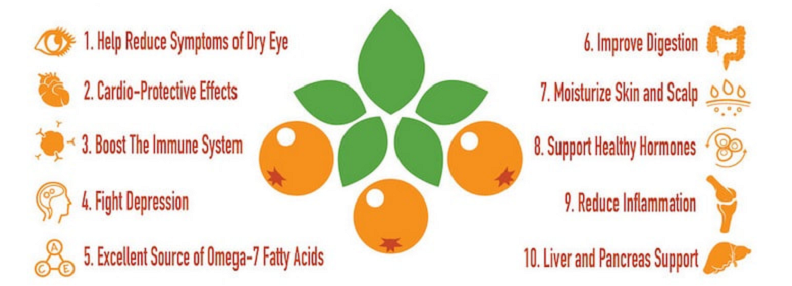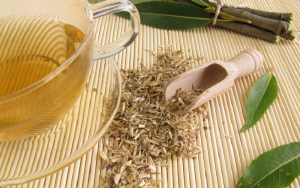
Sea buckthorn oil, derived from a plant that thrives in harsh climates, possesses an impressive profile of vitamins, antioxidants, and essential fatty acids, giving it a unique health-boosting potential. Whether you’re looking to fortify your immune system, enhance your skin health, or boost your cardiovascular health, sea buckthorn oil could be an exciting addition to your wellness regimen.
Contents
Understanding Sea Buckthorn Oil
With its deep roots in history and unique extraction process, sea buckthorn oil is a fascinating subject all on its own.
Origin and History of Sea Buckthorn
Sea buckthorn, or Hippophae rhamnoides, is a deciduous shrub native to Europe and Asia. It’s especially abundant in the high altitudes of the Himalayas, where it’s traditionally been used in Tibetan and Mongolian medicine. The name ‘sea buckthorn’ might be somewhat misleading, as the plant doesn’t grow near the sea, but rather in high altitude mountainous areas and temperate coastal regions. The plant’s name likely comes from its tendency to grow in sandy, sea-like soil and its thorny structure.
Historically, sea buckthorn has been utilized for a range of applications, from treating skin diseases to enhancing digestion. It was so highly regarded that ancient Greek texts refer to sea buckthorn as the preferred food of racehorses, with the belief that it would make them healthier and more robust.
Extraction Process of Sea Buckthorn Oil
Sea buckthorn oil is primarily derived from the seeds or pulp of the sea buckthorn berries. There are two types of oil: seed oil, which is extracted from the small, dark seeds, and fruit (or pulp) oil, derived from the fleshy pulp of the berries. Each has a unique composition and slightly different health benefits.
The extraction process typically involves cold pressing, which preserves the nutrients and doesn’t involve heat or chemical solvents. This results in a pure, high-quality oil. While the seed oil has a light color and a mild flavor, the fruit oil is dark orange, thicker, and has a strong musky flavor.
Constituents of Sea Buckthorn Oil
Both types of sea buckthorn oil have a rich nutritional profile. They are packed with various vitamins, minerals, antioxidants, and essential fatty acids.
Sea buckthorn oil is particularly notable for its omega fatty acid content. It’s one of the only plant sources known to provide all four omega fatty acids – omega-3, omega-6, omega-7, and omega-9. This unique combination of fatty acids is one of the elements that contributes to the oil’s wide range of health benefits.
Furthermore, sea buckthorn oil contains a wealth of vitamins, most notably vitamin E and vitamin C, both potent antioxidants that support overall health and well-being. It’s also abundant in carotenoids, plant pigments that have their own set of health benefits.

Nutritional Benefits of Sea Buckthorn Oil
Sea buckthorn oil is not just a plant-based oil; it’s a powerhouse of nutrients. Its unique blend of essential fatty acids, vitamins, and antioxidants offers a wealth of nutritional benefits that extend to various aspects of health.
Omega Fatty Acids in Sea Buckthorn Oil
One of the key features that make sea buckthorn oil truly stand out is its omega fatty acid content. These essential fats play a crucial role in maintaining optimal body function and health.
Sea buckthorn oil provides all four essential omega fatty acids: Omega-3, Omega-6, Omega-7, and Omega-9. Omega-3 and Omega-6 are vital for heart health, brain function, and inflammatory response. They are essential, meaning the body cannot produce them, so we must acquire them through our diet.
On the other hand, Omega-7 and Omega-9, while not classified as essential, still offer valuable health benefits. Omega-7 (palmitoleic acid), which is relatively rare in the plant kingdom, aids in skin and mucosal health. Omega-9 (oleic acid), promotes heart health and balanced blood sugar levels [1].
Vitamins Present in Sea Buckthorn Oil
Another nutritional highlight of sea buckthorn oil is its array of vitamins, particularly vitamin E and vitamin C.
Vitamin E is a fat-soluble vitamin known for its potent antioxidant properties. It aids in neutralizing harmful free radicals in the body, supports skin health, and bolsters the immune system.
Vitamin C is a water-soluble vitamin that also has powerful antioxidant effects. Besides, it is integral to collagen production (essential for skin and joint health), enhances iron absorption, and contributes to a robust immune system.
Additionally, sea buckthorn oil contains other essential vitamins like B1, B2, and folate, which contribute to the overall nutritional profile of this potent plant-based oil [2].
Antioxidant Properties of Sea Buckthorn Oil
In addition to its rich supply of omega fatty acids and vitamins, sea buckthorn oil is loaded with antioxidants, including carotenoids and flavonoids. These compounds have been widely studied for their health-promoting properties, primarily their ability to combat oxidative stress.
Oxidative stress occurs when there’s an imbalance between free radicals (harmful compounds that can damage cells) and antioxidants in your body. By providing a wealth of antioxidants, sea buckthorn oil can help restore this balance, protecting your cells from damage and potentially preventing a range of health conditions [3].

Health Benefits of Sea Buckthorn Oil
Given its rich nutritional profile, it’s no surprise that sea buckthorn oil holds numerous potential health benefits. From boosting immunity to promoting healthy skin and supporting cardiovascular health, this plant-based oil could be a vital component in maintaining and improving your wellbeing.
Immune System Boosting Potential
With its high concentration of vitamin C and antioxidants, sea buckthorn oil could provide a significant boost to your immune system. Vitamin C is well-known for its role in immune function, helping stimulate the production of white blood cells, which are crucial for your body’s defense against infections and diseases. The antioxidants in sea buckthorn oil also help protect the immune system by combating harmful free radicals and reducing inflammation.
Skin Health and Anti-Aging Benefits
Sea buckthorn oil has been traditionally used for skin health due to its omega-7 content and high levels of vitamin E. The fatty acids present, especially omega-7, help nourish the skin, maintain its hydration, and support its elasticity. On the other hand, vitamin E acts as a potent antioxidant, reducing UV-induced skin damage and signs of aging such as wrinkles and fine lines. Sea buckthorn oil can be used topically or taken orally for skin health [4].
Cardiovascular Health Improvement
The unique combination of omega fatty acids in sea buckthorn oil could support heart health. Omega-3 and Omega-6 fatty acids are known for their role in maintaining healthy blood pressure levels, reducing the risk of heart disease. They also help regulate cholesterol levels, further contributing to cardiovascular wellbeing.
Digestive Health Benefits
Traditionally, sea buckthorn oil has been used to aid digestion and treat various digestive disorders. The Omega-7 fatty acid, palmitoleic acid, is believed to nourish and protect the lining of the stomach and intestines, promoting overall digestive health. Furthermore, the oil’s anti-inflammatory properties could be beneficial in managing conditions such as gastritis or acid reflux [5].
Potential Benefits for Liver Health
Emerging research suggests that sea buckthorn oil may have liver-protecting properties. The antioxidants and healthy fats in the oil could help to protect liver cells from damage, promote liver regeneration, and maintain optimal liver function. However, more studies are needed to confirm these potential benefits.

Incorporating Sea Buckthorn Oil into Your Diet
Now that you’re familiar with the impressive health benefits of sea buckthorn oil, you might be wondering how you can integrate it into your daily routine. Thankfully, adding this powerful plant-based oil into your diet is fairly straightforward, and it can be incorporated in various delicious and nutritious recipes.
Safe Dosage and Consumption
Before we delve into the different ways you can use sea buckthorn oil, it’s crucial to understand the recommended dosage to ensure safe consumption. It’s recommended to follow the dosage instructions provided by the manufacturer on the bottle as concentrations can vary. However, a common dosage is 500mg of sea buckthorn oil, taken twice daily [6].
Remember to consult your healthcare provider before beginning a new supplement regimen, particularly if you’re pregnant, breastfeeding, or have a medical condition. It’s also advisable to start with a lower dose to see how your body responds before increasing to the full recommended dosage.
Delicious and Nutritious Recipes Incorporating Sea Buckthorn Oil
Sea buckthorn oil has a unique, tangy flavor that can add a nice twist to various dishes. Here are a few ways you can incorporate it into your meals:
- Smoothies: Blend a teaspoon of sea buckthorn oil with your favorite fruits, a handful of spinach or kale, and a scoop of protein powder for a nutrient-dense breakfast or snack.
- Salad Dressings: Mix sea buckthorn oil with vinegar, lemon juice, and your preferred herbs for a tangy, health-boosting salad dressing.
- Cooking Oil: You can also use sea buckthorn oil as a cooking oil for light sautéing or roasting. However, be mindful of its strong flavor that may influence the taste of your dishes.
Remember, sea buckthorn oil is heat sensitive. To preserve its nutritional properties, try adding it to your dishes after the cooking process.
Sea buckthorn oil can be a versatile addition to your pantry. Not only does it pack a nutritional punch, but it can also add a unique flavor to your meals, making your culinary experiments both healthy and exciting.
Possible Sea Buckthorn Oil Side Effects and Precautions
While sea buckthorn oil is generally considered safe for most people when consumed in moderation, it’s still important to be aware of potential side effects and precautions. As with any supplement, individual reactions can vary, and it’s crucial to listen to your body and consult with a healthcare provider, especially if you’re new to this potent plant-based oil.
Known Side Effects of Sea Buckthorn Oil
Sea buckthorn oil is generally well-tolerated, but some people may experience side effects, especially when consumed in large amounts. These might include:
- Diarrhea or Stomach Cramps: Due to its high fatty acid content, consuming large amounts of sea buckthorn oil might lead to digestive issues in some individuals.
- Skin Reactions: Topical application of sea buckthorn oil could potentially cause a skin rash or irritation in some people, especially those with sensitive skin. Always do a patch test before applying it broadly.
- Blood Thinning: Sea buckthorn oil has potential blood-thinning properties. If you’re on anticoagulant medication or have a blood clotting disorder, it’s advisable to consult your doctor before using sea buckthorn oil.
Who Should Be Cautious?
Certain individuals should exercise caution when considering adding sea buckthorn oil to their diet:
- Pregnant or Breastfeeding Women: While there’s no concrete evidence suggesting that sea buckthorn oil is harmful during pregnancy or breastfeeding, it’s always a good idea to consult a healthcare provider before starting any new supplements during these periods.
- People with Bleeding Disorders or Undergoing Surgery: Due to its potential blood-thinning properties, individuals with bleeding disorders or those about to undergo surgery should consult a healthcare professional before using sea buckthorn oil.
- Individuals with High Blood Pressure: While the omega fatty acids in sea buckthorn oil are generally beneficial for heart health, the oil could potentially lower blood pressure. If you have low blood pressure or are on blood pressure medication, it’s advisable to speak with your doctor before starting sea buckthorn oil.
Despite the potential side effects and precautions, sea buckthorn oil remains a powerful plant-based oil with a plethora of health benefits for most people when used appropriately. Always start with a low dose to see how your body responds and adjust accordingly under the guidance of your healthcare provider.
References
[1] Sea buckthorn oil benefits for hair, acne, estrogen, and more
[2] Top 11 Health Benefits of Sea Buckthorn Oil
[3] Abundance of active ingredients in sea-buckthorn oil
[4] Phytochemistry, health benefits, and food applications of sea buckthorn (Hippophae rhamnoides L.)
[5] The impact of sea buckthorn oil fatty acids on human health
[6] Potential health benefits of Sea buckthorn oil- A review






